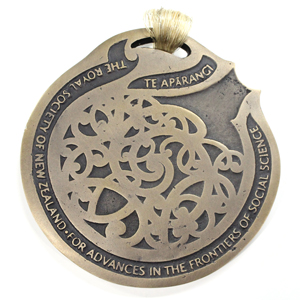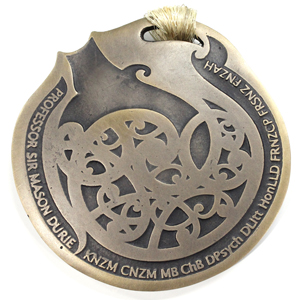About the medal
About the medal
Design of the Medal

Mason Durie Medal (front)

Mason Durie Medal (back)
In the manner of a traditional taonga the medal shape refers to a matau or fishhook, which symbolises authority and leadership. Dual sided, the matau represent prosperity and strength. The koru based surface decorations are composed as an interconnected pattern. This arrangement is inspired by the concept of kōtuitui. It signifies the importance of linking people, families and communities together from all parts of our society. Through these elements the medal celebrates the outstanding achievements of Sir Mason Durie FRSNZ and his continued contribution to science, the humanities and Māori knowledge.
This medal is an individual bronze casting by Rotorua artist, George Andrews. Along with its matai display case the medal is entirely hand crafted here in Aotearoa.
The medal was designed by Ngāi Tahu artist, Professor Ross Hemera of Massey University College of Creative Arts.
Background of the Medal
Professor Sir Mason Durie is a member of the Rangitāne, Ngāti Kauwhata, and Ngāti Raukawa tribes. He graduated in medicine in 1963 and completed specialist training in psychiatry and was appointed Director of Psychiatry at the Palmerston North Hospital in 1976.
From 1986-1988 he was a Commissioner on the Royal Commission on Social Policy and was appointed to the chair in Māori Studies at Massey University in 1988. He is currently Professor of Māori Research and Development, Deputy Vice-Chancellor, and Assistant Vice-Chancellor (Māori & Pasifika) at Massey University. He is a member of Te Mana Whakahaere (the governing body of Te Wananga o Raukawa) and chairs Te Kahui Amokura, the NZ Vice-Chancellor’s Māori Committee. He has been a Commissioner on the New Zealand Families Commission and led the Guardians Group of Secondary Futures.
Apart from research into health outcomes and practice methodologies he has been closely involved with the ongoing development of health policy in New Zealand and has worked extensively with Māori community health providers. Professor Durie has a special interest in Māori health workforce development and remains actively involved as Chair of the Henry Rongomau Bennett Māori Health Leadership Foundation, Te Rau Puawai, and Te Rau Matatini. He is a member of the Whānau Ora Governance Group, an advisor to Health Workforce New Zealand, and Chair of the DHBRF Mental Health Committee. He was knighted in 2010 for his services to public health and to Māori health.
This medal commemorates his outstanding contribution to the Social Sciences in New Zealand and the international acclamation of his work.
